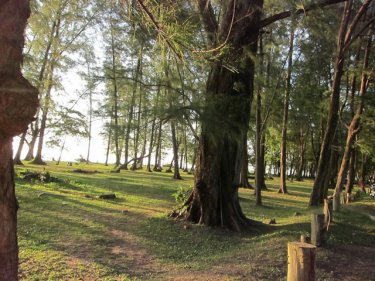PHUKET: Pressure is mounting for authorities to properly protect Phuket's beaches with the announcement that one Phuket beach is being considered for recognition as a National Surfing Reserve.
Australian Brad Farmer, who founded the NSR movement in his home country and who hopes to protect the world's best beaches, announced the nomination of Phuket's Nai Yang beach yesterday.
It's now up to Phuket and Thai authorities to take the protection of Nai Yang and other Phuket beaches to the next stage.
''This is not just about protecting beaches for board surfers, but for all people who use beaches and who believe they should be kept in a natural state,'' he said.
''The surfing reserve concept is a symbolic dedication so that surfing areas are recognised as coastal resources worthy of conservation. A reserve is essentially a badge of merit, a proactive endorsement to recognise iconic natural locations around the world.''
Mr Farmer surveyed several other beaches and rejected many for nomination because of the presence of jet-skis and signs that the authorities were not capable of protecting others.
Nai Yang was primarily chosen because Sirinath National Park already provides a degree of protection that is not evident at other Phuket beaches.
Steven Martin, a coastal researcher on Phuket with Prince of Songkla University's Faculty of Environmental Management and a supporter of the project, sees the nomination of a Phuket beach as ''a golden opportunity for Thailand to show its forward thinking and proactive effort toward conservation on the Andaman Coast.''
Coincidentally, Mr Farmer's call for better beach protection dovetails with the ''Save the Beaches'' campaign by Phuketwan for a new, single authority to protect Phuket's most precious tourism attractions from encroachment and degradation.
The National Surfing Reserve movement has been highly successful in Australia, regarded as the country with the greatest number of beaches of quality in the world.
The way in which most beaches on Phuket are used for private commercial purposes would not be tolerated in Australia, where the long-term natural advantages of preserving beaches are seen as far more important than short-term profit.
''There is no doubt that best beaches on Phuket have an importance for their special heritage,'' Mr Farmer told Phuketwan. ''The hard part is preserving them for the future. Special spots need to be kept special. ''
Mr Farmer's next project is working on a 'Guide to Australia's Best Beaches.' He says he is committed to trying to save the world's best beaches for posterity.
Phuket has to hope he can help to bring change in a hurry here.
Mr Farmer had the support of the Tourism Authority of Thailand on his visit to Phuket.
Australian Brad Farmer, who founded the NSR movement in his home country and who hopes to protect the world's best beaches, announced the nomination of Phuket's Nai Yang beach yesterday.
It's now up to Phuket and Thai authorities to take the protection of Nai Yang and other Phuket beaches to the next stage.
''This is not just about protecting beaches for board surfers, but for all people who use beaches and who believe they should be kept in a natural state,'' he said.
''The surfing reserve concept is a symbolic dedication so that surfing areas are recognised as coastal resources worthy of conservation. A reserve is essentially a badge of merit, a proactive endorsement to recognise iconic natural locations around the world.''
Mr Farmer surveyed several other beaches and rejected many for nomination because of the presence of jet-skis and signs that the authorities were not capable of protecting others.
Nai Yang was primarily chosen because Sirinath National Park already provides a degree of protection that is not evident at other Phuket beaches.
Steven Martin, a coastal researcher on Phuket with Prince of Songkla University's Faculty of Environmental Management and a supporter of the project, sees the nomination of a Phuket beach as ''a golden opportunity for Thailand to show its forward thinking and proactive effort toward conservation on the Andaman Coast.''
Coincidentally, Mr Farmer's call for better beach protection dovetails with the ''Save the Beaches'' campaign by Phuketwan for a new, single authority to protect Phuket's most precious tourism attractions from encroachment and degradation.
The National Surfing Reserve movement has been highly successful in Australia, regarded as the country with the greatest number of beaches of quality in the world.
The way in which most beaches on Phuket are used for private commercial purposes would not be tolerated in Australia, where the long-term natural advantages of preserving beaches are seen as far more important than short-term profit.
''There is no doubt that best beaches on Phuket have an importance for their special heritage,'' Mr Farmer told Phuketwan. ''The hard part is preserving them for the future. Special spots need to be kept special. ''
Mr Farmer's next project is working on a 'Guide to Australia's Best Beaches.' He says he is committed to trying to save the world's best beaches for posterity.
Phuket has to hope he can help to bring change in a hurry here.
Mr Farmer had the support of the Tourism Authority of Thailand on his visit to Phuket.





I was recently told how much certain restaurants were paying to use the beach at Surin for their private business.
There is also an attempt under way to remove a certain person from his position in local government because of this.
It seems the payments demanded double every year and the figures I heard were in the millions of baht.
A number of places now have their beach chairs all the way down to the waters edge leaving little room for anybody else to enjoy the beach.
Many locals are furious about this because in the past all the small beach side businesses were ordered off the beach.
Now people with deeper pockets have moved in and are doing as they please in turning a public beach into their own private enterprise.
Posted by logbags on November 5, 2011 18:42